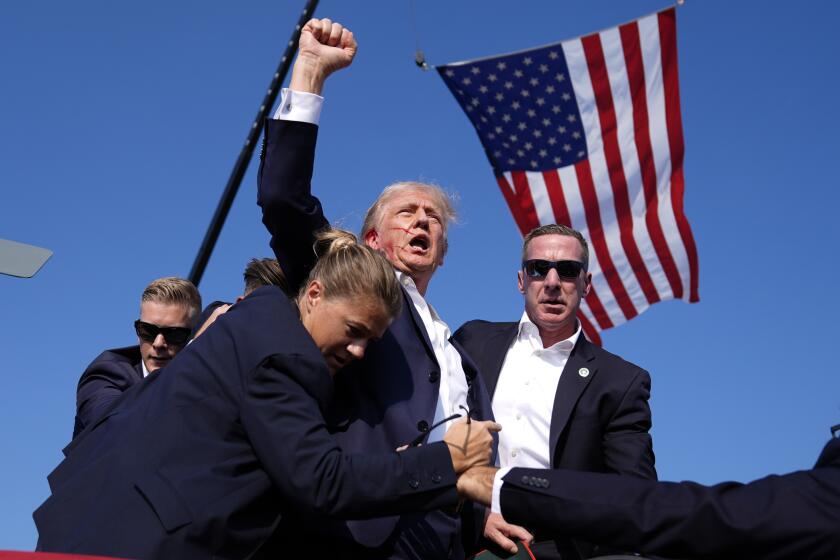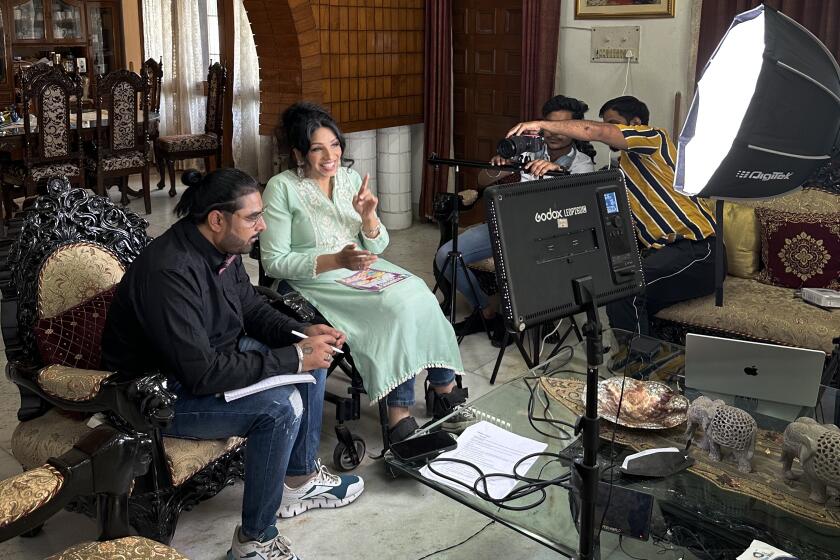A British Gent With More Than a Touch of Vision
Back when wireless meant radio and mobile telephones were as unwieldy as Maxwell Smart’s shoe, Chris Gent was already convinced that, whatever you called them, portable phones were the future in telecommunications.
Gent, chief executive of Vodafone Group, is still looking ahead with his company’s successful bid to purchase AirTouch Communications Inc. of San Francisco. The $62-billion acquisition would make it the world’s largest mobile phone enterprise.
Gent would become chief executive of Vodafone AirTouch, as the company would be called upon completion of the deal later this year. The new firm would have the potential to reach nearly 1 billion customers in more than 20 countries on five continents. No other wireless company comes close in size or scope.
Vodafone AirTouch is intended to be what Gent calls “a huge engine of growth” in a fast-changing industry. The future he envisions is one of wireless telephones--or mobiles as they are known in Europe--replacing fixed-line phones.
His aim is to get half the developed world’s phone users onto mobiles by 2003, and to develop a universal wireless system that will allow them to take their pocket-size phones anywhere on the globe.
“We believe people would rather communicate whenever they want, wherever they may be,” said AirTouch chief Sam Ginn, who would become chairman of the new venture.
Given Gent’s rate of success, they are apt to meet their goals.
The British media calls Gent the Bill Gates of mobile phones--and means it as a compliment. Gent, 50, is a self-made manager in a pull-yourself-up-by-your-bootstraps company that has risen to the top in less than 15 years. He was out of the country and unavailable for an interview.
Vodafone is Britain’s seventh-largest company and one of the best-rated on the London Stock Exchange. The AirTouch bid--Britain’s biggest takeover deal--would move it up to third place, valuing it at more than $110 billion.
“Vodafone has led the way in mobile phones the entire time. Their competitors have not caught up with them once,” said Tressan MacCarthy, a telecommunications industry analyst at Credit Lyonnais Securities in London. “They have a faultless track record. They have never failed to meet forecasts. In fact, they have beaten expectations every time.”
Many industry analysts credit Gent, whom they describe as a charming and affable cricket fan with unbending drive. He is known to view the competitive mobile phone market as a “hunt or be hunted world.” As for Vodafone, he has been quoted as saying, “We’re a hunter.”
The son of a career navy man, Gent left school and went to work as a teenager after his father died. He began his management career as a trainee at NatWest Bank in the 1960s and then took various positions in the computer industry before joining Vodafone as managing director of British operations in 1985. At the time, Vodafone was a division of British defense company Racal Electronics and was just launching its mobile phone operations.
Vodafone expanded beyond Britain under its first chief executive, Gerald Whent, and split off from Racal in 1991. Whent retired in 1997 and Gent took over.
“Chris realized early on that there was a huge opportunity here,” said SG Securities analyst John Tysoe. “When he started in 1985, AT&T; had turned down the U.S. mobile market, and in Britain, BT [British Telecom] said, ‘In five years there will be 20,000 mobile customers and we’ll have 80% of the market.’ Well, there was nearly a million customers and Vodafone had 56% of the market.”
In fact, Vodafone signed its millionth customer in 1993. Through its aggressive marketing, Vodafone says, it signed nearly as many new customers in Britain in the last quarter of 1998 alone--933,000 of them, bringing its British total to more than 5 million, or about 38% of today’s larger and more crowded market.
Beyond Britain, Vodafone has interests in mobile operations in Australia and 12 other countries in Europe and Africa. It also has an interest in the Globalstar satellite system and nearly 10 million customers worldwide based on its ownership share of its global ventures.
Tysoe, who has known Gent for 15 years and spent “an occasional day out” with him, said Vodafone’s dynamic character is apparent at its headquarters in Newbury, about 55 miles west of London. Touring the offices a few years ago, Tysoe recalled, he turned to Gent and said, “I get the feeling everyone here thinks they are working for the best company in the country.”
“I’d never felt it before,” Tysoe said later. “There was something intangible about the place. Partly it was the fact that they were in such an exciting industry, but also there was a strong sense of shared purpose.”
Some of that originates with Racal, which always saw itself as different, “a company apart from others,” Tysoe said. Much of it comes from Gent, who has expanded the company quickly in international markets.
Gent was in Australia on business and pleasure--watching England’s cricket team, which Vodafone sponsors--when he helped to finalize the AirTouch agreement by mobile phone after Bell Atlantic Corp. withdrew from the bidding.
Despite the future company’s potential for overwhelming dominance, the deal is expected to win regulatory approval. AirTouch offers service primarily on the West Coast and overseas. The only overlap in the two companies’ current operations is in Germany, and Vodafone is planning to sell its 17% share in E Plus, the German mobile phone network.
The merger has been friendly among the two former competitors, which have similar corporate backgrounds--that of fast-growing market leaders. Each would provide seven of the 14 directors on the new board. Vodafone’s Newbury headquarters would be the head office, with the AirTouch base in San Francisco becoming the regional headquarters for the United States and Asia-Pacific regions.
“We have created a company positioned to take care of all the dynamics we see in telecommunications,” said Ginn.
Shareholders at both companies must approve the deal.
Vodafone AirTouch would work to expand its base in the United States with some kind of partnership--with losing bidder Bell Atlantic, it hopes. Gent wants to bring the pace of growth in the U.S. up to standards in Europe, where mobile phones are widely seen in use in restaurants, gyms, train stations, airports and parks.
Vodafone plans to take its aggressive marketing model to the U.S. In Britain, distribution is organized into three businesses: Vodafone Retail, focusing on consumers and small to medium-size businesses through 240 of its own retail stores; Vodafone Connect, targeting consumers and small businesses through independent retailers; and Vodafone Corporate, which targets major corporate accounts through a direct-sales force.
The company also plans to have a say in the development of so-called third-generation technology that would set a worldwide standard in the wireless industry and make mobile phones functional anywhere.
The weight of Vodafone AirTouch “gives you a large voice at the table,” said Terry Barwick, Vodafone’s director of corporate affairs.
Gent may well be at the head of that table. Described as “low-key in U.S. terms,” he is not to be underestimated.
“He’s determined,” Tysoe said. “That has come across strongly in the last week or two.”
(BEGIN TEXT OF INFOBOX / INFOGRAPHIC)
Wireless Giant
Vodafone’s proposed $62-billion acquisition of AirTouch Communications would create the world’s largest wireless provider with the potential to reach 1 billion customers in 23 countries on four continents. A look at both companies and at Vodafone’s revenue and earnings since 1994:
Vodafone Group
Headquarters: Newbury, England
Chief Executive: Chris Gent
Employees: 11,500
Worldwide customer base: About 9.5 million*
Reach in Britain: About one in 15 British residents owns a Vodafone
Company history: Began as a division of Racal Electronics in the early 1980s. In 1982, the company won a license to build Britain’s second cellular network. Vodafone was launched in January 1985.
1998 revenue**: $4.13 billion
1998 earnings**: $747.6 million
* Based on the company’s ownership share of ventures in Britain, Australia, Egypt, France, Germany, Greece, Malta, the Netherlands, New Zealand, Fiji, South Africa, Sweden and Uganda at the end of 1998.
** For the company’s 1998 fiscal year, which ended March 1998.
Vodafone Stock Price
U.S.-listed shares; monthly closes and latest on the New York Stock Exchange.
1999, Friday: $187.38
AirTouch Communications
Headquarters: San Francisco
Chief Executive: Sam L. Ginn
Employees: 12,500
Worldwide customer base: About 17.6 million*
Reach in the U.S.: About 11.8 million cellular, PCS and paging customers
Company history: The 13-year-old firm was renamed AirTouch in 1994 right before it was spun off from Pacific Telesis Group.
1998 revenue**: $5.44 billion
1998 earnings**: $400 million
* Based on the company’s ownership share of ventures in Belgium, Egypt, Germany, India, Italy, Japan, Poland, Portugal, Romania, South Korea, Spain and Sweden at the end of 1998.
** Includes proportion of subscribers taken from partnerships and joint ventures. Numbers are through third quarter 1998. They do not include PrimeCo subscribers.
Vodafone’s revenue and earnings
Revenue
Year Revenue, in billions
1994 $1.26
Airtouch Stock Price
Monthly closes and latest on the New York Stock Exchange.
1999, Friday: $93.88
*
Source: Bloomberg News, Bridge, company reports
Researched by JENNIFER OLDHAM / Los Angeles Times



